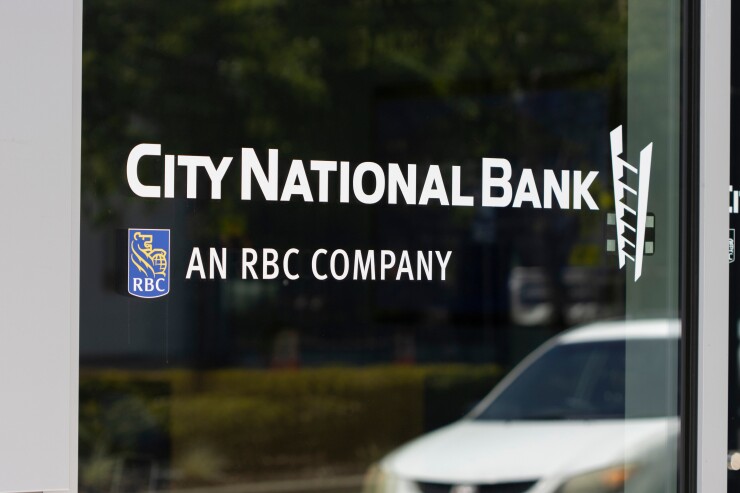
UPDATE: This article includes additional information from RBC's earnings materials, including the company's call with analysts.
The beleaguered Los Angeles-based subsidiary of Royal Bank of Canada is showing early signs of a comeback.
City National Bank posted net income of $66 million between August and October, its strongest performance in six quarters.
While the bottom-line results were still well below the bank's average quarterly earnings between 2019 and 2022, RBC CEO Dave McKay said there's room for additional improvement as City National's efficiency improves.
"We have to certainly build a better operational infrastructure. We're well on our way to doing that," McKay told analysts Wednesday during an earnings call. "We've peaked in our expenses there."
RBC has been seeking to integrate City National, which got
The moves follow a rocky 2023, when City National suffered more than most U.S. banks from rising interest rates. Its deposit costs rose, and the bank racked up
For the fiscal year that ended this fall, City National's net income rebounded partially, totaling $144 million. RBC executives said in May that they expected City National to achieve
During the fiscal year that ended Oct. 31, 2023, City National reported a net loss of $182 million. In the four previous fiscal years, the bank's net income had ranged from $260 million to $455 million.
Analysts at Jefferies wrote in a note to clients Wednesday that the outlook for additional contributions to RBC's earnings growth from City National bodes well for next year's outlook. RBC has set a medium-term objective of delivering a 16% return on equity, up from a three-year reported average of 15%.
RBC acquired City National nine years ago, and McKay said Wednesday that the bank "remains an important element of our growth strategy in the United States."
Overall, RBC posted net income of $4.22 billion Canadian dollars ($3 billion) in the fourth quarter, up from CA$3.94 billion in the year-ago period. Per share, earnings were CA$2.91, up from CA$2.76 a year ago. The results beat analysts' expectations of earnings of CA$2.81 per share, according to S&P Capital IQ.
The bank said most of its units posted higher earnings, but lower results in its corporate support division weighed on the final quarterly number, while results in capital markets were relatively flat. The inclusion of results from HSBC Canada, which RBC acquired earlier this year, boosted net income by CA$265 million, RBC said.
RBC's quarterly revenue rose to CA$15.07 billion from CA$12.69 billion a year ago.
Provisions for credit losses rose 17% from a year ago to CA$120 million, mainly reflecting higher set-asides in commercial and personal banking. RBC said the provisions were "partially offset by releases of provisions in the current quarter in Wealth Management as compared to provisions taken in the prior year and lower provisions in Capital Markets."
The Common Equity Tier 1 ratio was 13.2%, down from 14.5% a year ago but still above requirements, RBC said.
During RBC's earnings call on Wednesday, the bank's top executives were asked about the possibility of a trade war between Canada and the United States. Late last month, President-elect Donald Trump vowed to impose a 25% tariff on all goods imported from Canada and Mexico, which could hinder trade flows within North America.
RBC Chief Risk Officer Graeme Hepworth indicated that the bank expects an outcome that is ultimately less onerous following negotiations between the U.S. and Canadian governments.
"I would just remind you that uncertainty is something we constantly think about and face, and that's why we do run multiple scenarios in our provisioning," Hepworth said. "And some of those adverse scenarios absolutely kind of capture the kind of consequences that could play out if tariffs come into play."
In its annual report to shareholders on Wednesday, RBC said the future of global trade "remains uncertain."
"Increased global polarization, protectionist measures, including protectionist trade policies and the imposition of tariffs, and economic nationalism could reshape global alliances and financial systems," the bank wrote.






